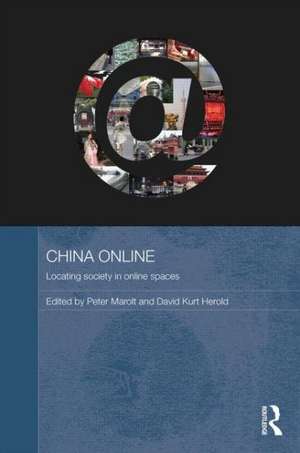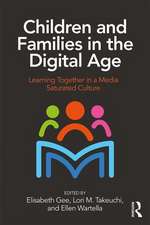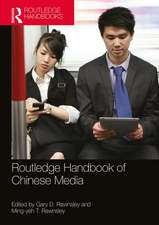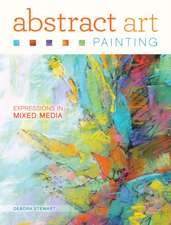China Online: Locating Society in Online Spaces: Media, Culture and Social Change in Asia
Editat de Peter Marolt, David Kurt Herolden Limba Engleză Hardback – 11 noi 2014
| Toate formatele și edițiile | Preț | Express |
|---|---|---|
| Paperback (1) | 449.41 lei 6-8 săpt. | |
| Taylor & Francis – 12 oct 2017 | 449.41 lei 6-8 săpt. | |
| Hardback (1) | 1216.52 lei 6-8 săpt. | |
| Taylor & Francis – 11 noi 2014 | 1216.52 lei 6-8 săpt. |
Din seria Media, Culture and Social Change in Asia
-
 Preț: 378.83 lei
Preț: 378.83 lei -
 Preț: 329.94 lei
Preț: 329.94 lei -
 Preț: 297.40 lei
Preț: 297.40 lei -
 Preț: 364.22 lei
Preț: 364.22 lei - 18%
 Preț: 1276.52 lei
Preț: 1276.52 lei - 28%
 Preț: 820.73 lei
Preț: 820.73 lei -
 Preț: 367.83 lei
Preț: 367.83 lei - 18%
 Preț: 1272.58 lei
Preț: 1272.58 lei - 18%
 Preț: 1220.31 lei
Preț: 1220.31 lei -
 Preț: 487.47 lei
Preț: 487.47 lei - 18%
 Preț: 1162.84 lei
Preț: 1162.84 lei -
 Preț: 383.63 lei
Preț: 383.63 lei - 18%
 Preț: 1167.71 lei
Preț: 1167.71 lei -
 Preț: 415.24 lei
Preț: 415.24 lei - 18%
 Preț: 703.45 lei
Preț: 703.45 lei - 26%
 Preț: 874.74 lei
Preț: 874.74 lei - 18%
 Preț: 1054.27 lei
Preț: 1054.27 lei -
 Preț: 459.71 lei
Preț: 459.71 lei - 18%
 Preț: 1003.43 lei
Preț: 1003.43 lei - 11%
 Preț: 323.91 lei
Preț: 323.91 lei -
 Preț: 383.63 lei
Preț: 383.63 lei - 15%
 Preț: 426.77 lei
Preț: 426.77 lei - 18%
 Preț: 1059.84 lei
Preț: 1059.84 lei - 18%
 Preț: 1058.43 lei
Preț: 1058.43 lei -
 Preț: 412.19 lei
Preț: 412.19 lei - 18%
 Preț: 1057.75 lei
Preț: 1057.75 lei - 18%
 Preț: 1164.92 lei
Preț: 1164.92 lei - 18%
 Preț: 1219.72 lei
Preț: 1219.72 lei - 18%
 Preț: 1054.75 lei
Preț: 1054.75 lei - 18%
 Preț: 1108.73 lei
Preț: 1108.73 lei -
 Preț: 402.13 lei
Preț: 402.13 lei - 18%
 Preț: 1219.72 lei
Preț: 1219.72 lei -
 Preț: 408.74 lei
Preț: 408.74 lei - 26%
 Preț: 846.09 lei
Preț: 846.09 lei - 18%
 Preț: 1270.19 lei
Preț: 1270.19 lei - 18%
 Preț: 1219.65 lei
Preț: 1219.65 lei -
 Preț: 409.69 lei
Preț: 409.69 lei - 18%
 Preț: 1166.17 lei
Preț: 1166.17 lei
Preț: 1216.52 lei
Preț vechi: 1483.57 lei
-18% Nou
Puncte Express: 1825
Preț estimativ în valută:
232.81€ • 242.16$ • 192.20£
232.81€ • 242.16$ • 192.20£
Carte tipărită la comandă
Livrare economică 15-29 aprilie
Preluare comenzi: 021 569.72.76
Specificații
ISBN-13: 9781138809291
ISBN-10: 1138809292
Pagini: 200
Ilustrații: 2 black & white tables, 6 black & white line drawings
Dimensiuni: 156 x 234 x 15 mm
Greutate: 0.41 kg
Ediția:1
Editura: Taylor & Francis
Colecția Routledge
Seria Media, Culture and Social Change in Asia
Locul publicării:Oxford, United Kingdom
ISBN-10: 1138809292
Pagini: 200
Ilustrații: 2 black & white tables, 6 black & white line drawings
Dimensiuni: 156 x 234 x 15 mm
Greutate: 0.41 kg
Ediția:1
Editura: Taylor & Francis
Colecția Routledge
Seria Media, Culture and Social Change in Asia
Locul publicării:Oxford, United Kingdom
Public țintă
PostgraduateCuprins
Part 1: Deliberating Online Spaces 1. Grounding Online Spaces 2. Users, not Netizens: Spaces and Practices on the Chinese Internet Part 2: Defining Online Spaces 3. “The Corpses were Emotionally Stable”: Agency and Passivity on the Chinese Internet 4. Regarding Subjectivities and Social Life on the Screen: The Ambivalences of Spectatorship in the People’s Republic of China Part 3: Claiming Online Spaces 5. A Framing Analysis of Chinese Independent Candidates’ Strategic Use of Microblogging for Online Campaign and Political Expression 6. China’s Dream of High-speed Growth Gets Rear-ended: The “Wenzhou 723” Microblogging Incident and the Erosion of Public Confidence Part 4: Enjoying Online Spaces 7. Gold Farmers and Water Army: Digital Playbor with Chinese Characteristics 8. Chinese Fansub Groups as Communities of Practice: An Ethnography of Online Language Learning Part 5: Shaping Online Spaces 9. Balancing Market and Politics: The Logic of Organizing Cyber Communities in China 10. The Role of Chinese Internet Industry Workers in Creating Alternative Online Spaces
Recenzii
'...this book offers a sense of freshness in dealing with Chinese internet studies that eschews the dogmatic paradigms often found in current literature by proposing a new conceptualization of Chinese internet users as well as an ethnographic ‘everyday-life-approach’ to the field of study.'
Giuseppe Minacapilli, East China Normal University, Asiascape: Digital Asia
Giuseppe Minacapilli, East China Normal University, Asiascape: Digital Asia
Descriere
The Chinese internet is driving change across all facets of social life, and scholars have grown mindful that online and offline spaces have become interdependent and inseparable dimensions of social, political, economic, and cultural activity. This book showcases the richness and diversity of Chinese cyberspaces, conceptualizing online and offline China as separate but inter-connected spaces in which a wide array of people and groups act and interact. The book argues that online spaces allow their users greater "freedoms" despite ubiquitous control and surveillance by the state authorities. The book is a sequel to the editors’ earlier work, Online Society in China (Routledge, 2011).
















